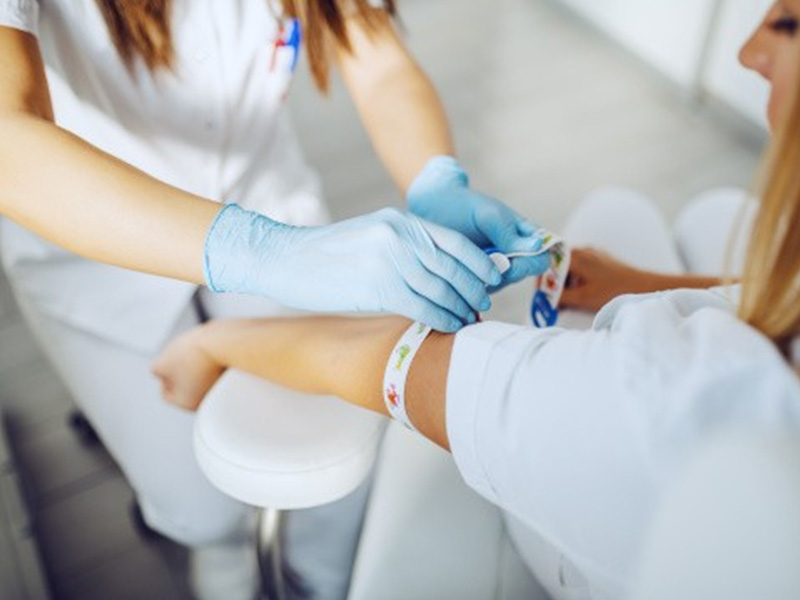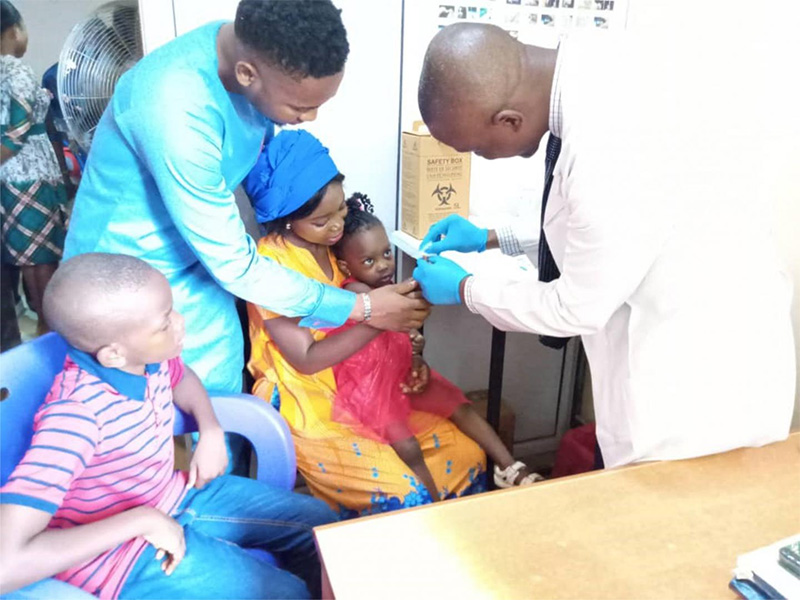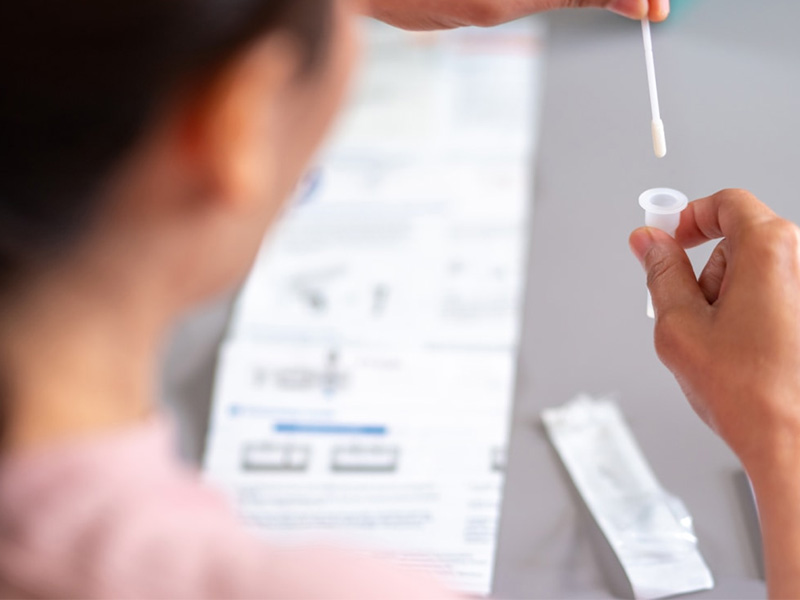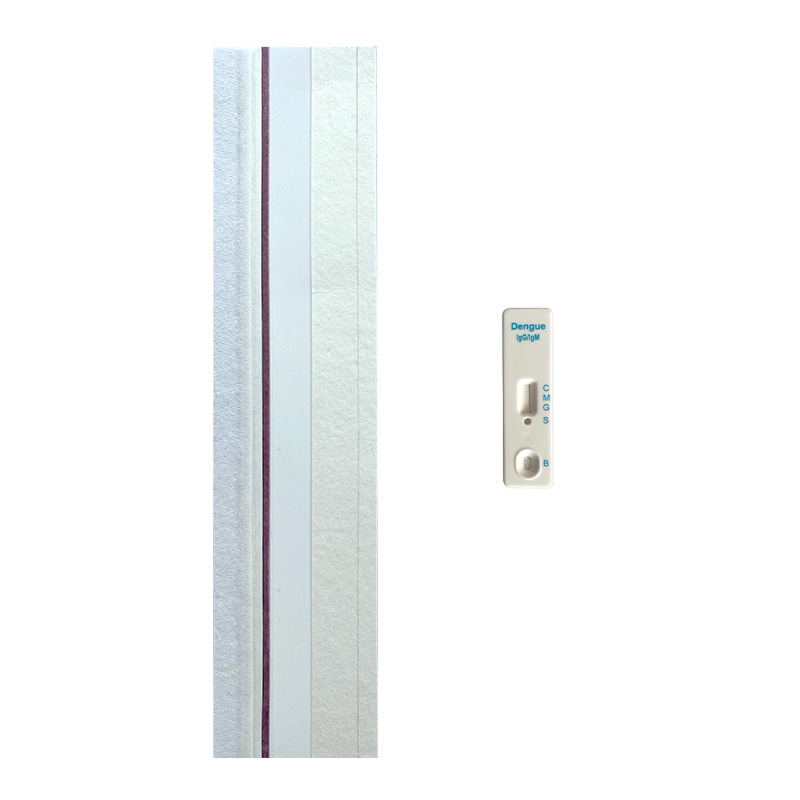Tropical Disease Test Uncut Sheet
NewScen provides a comprehensive range of tropical disease lateral flow rapid test kits, ensuring swift and accurate detection of various infections including MAR (Pf/Pan), Dengue IgG/IgM, Dengue NS1, Zika IgG/IgM, Zika NS1, Chikungunya IgG/IgM.
We offer uncut sheets for all our products, allowing for flexible customization and scalability. Trust NewScen for reliable and efficient tropical disease testing solutions.
List of Other Available Tropical Disease Test Uncut Sheet
NewScen provides rapid diagnostic test uncut sheets for all our produced lateral flow assays. If the specific uncut sheet you require is not listed, please don’t hesitate to contact us for more details.
| UNCUT SHEET | PRODUCT DESCRIPTION |
| ZIKA (IgG/IgM) | Zika Virus IgG/IgM Rapid Test Kit Uncut Sheet |
| ZIKA (NS1 Ag) | Zika NS1 Antigen Rapid Test Kit Uncut Sheet |
| CHIK (IgG/IgM) | Chikungunya IgG/IgM Rapid Test Kit Uncut Sheet |
| More… | ……………….. |
Understanding Our Target Audience






Please feel free to contact us immediately to request samples for your Uncut Sheet business before commencing the rapid test production.
FAQ
Dengue is a viral infection caused by the dengue virus, which is transmitted to humans through the bites of infected mosquitoes, primarily Aedes aegypti and Aedes albopictus. When a person is infected with the dengue virus, the body produces various antibodies and antigens as part of the immune response. Three commonly tested markers for dengue infection are Dengue IgG, IgM, and NS1.
*Dengue IgG: Immunoglobulin G (IgG) is an antibody that is produced by the immune system in response to an infection. IgG antibodies are typically detectable after the acute phase of dengue infection. They provide long-term immunity and are useful for determining whether a person has been previously exposed to the dengue virus.
*Dengue IgM: Immunoglobulin M (IgM) is another type of antibody produced by the immune system. IgM antibodies are typically detectable during the early stages of dengue infection and can indicate a current or recent infection. IgM levels rise within a few days of infection and usually decline after a few weeks.
*NS1 Antigen: NS1 stands for Non-Structural Protein 1, which is a viral protein produced by the dengue virus. NS1 antigen is detectable in the blood during the early stages of infection, even before the body produces antibodies. NS1 tests are often used for rapid diagnosis of dengue infections. This test is useful for detecting acute dengue infections within the first few days of symptoms.
The combination of these tests, along with clinical symptoms and other diagnostic criteria, helps healthcare professionals in diagnosing and managing dengue infections. It's important to note that the interpretation of these tests should be done by qualified healthcare providers in the context of the individual's symptoms and medical history.
If you suspect you have dengue fever or have received a positive NS1 test result, it is important to consult with a healthcare professional for proper diagnosis and treatment. They will be able to evaluate your specific condition and provide appropriate medical advice.
In general, the management of dengue fever focuses on supportive care to relieve symptoms and prevent complications. Here are some common approaches:
1. Fluid replacement: Dengue can cause dehydration due to fever, sweating, vomiting, and loss of appetite. Replenishing fluids orally or through intravenous (IV) fluids is important to maintain hydration.
2. Rest: Getting plenty of rest is crucial to allow the body to recover and heal.
3. Pain relief: Over-the-counter pain relievers like acetaminophen (paracetamol) are typically recommended to relieve fever, headache, and body aches. Non-steroidal anti-inflammatory drugs (NSAIDs) such as ibuprofen and aspirin should be avoided as they can increase the risk of bleeding.
4. Monitoring: Regular monitoring of vital signs, blood pressure, platelet count, and hematocrit levels is important to detect any worsening of the condition or signs of complications.
5. Hospitalization: Severe cases of dengue may require hospitalization, especially if there are signs of plasma leakage, bleeding, organ impairment, or severe symptoms. In the hospital, close monitoring and further medical interventions can be provided.
It's important to follow the guidance and recommendations of healthcare professionals as they can tailor the treatment based on the severity of the disease and individual patient needs. They will be able to provide you with specific instructions on how to manage your condition effectively.
Zika and chikungunya are two distinct viral infections transmitted by mosquitoes, but they differ in terms of their causative agents, symptoms, and potential complications.
Zika virus is primarily transmitted by the Aedes mosquito, although it can also spread through sexual contact and from mother to fetus during pregnancy. The infection is commonly characterized by mild symptoms such as fever, rash, joint pain, headache, and conjunctivitis. In many cases, Zika infection may be asymptomatic or cause only mild illness. However, it can pose a significant risk to pregnant women, as it has been linked to severe birth defects such as microcephaly and other neurological complications.
On the other hand, chikungunya virus is also transmitted by Aedes mosquitoes. The infection typically presents with symptoms such as high fever, severe joint pain, muscle pain, headache, rash, and fatigue. The joint pain caused by chikungunya can be debilitating and may persist for several months or even years in some cases. Unlike Zika, chikungunya generally does not have a significant impact on pregnancy or cause birth defects.
In summary, while both Zika and chikungunya are mosquito-borne diseases, Zika has a greater potential for severe complications in pregnant women, including birth defects. Chikungunya, on the other hand, primarily causes debilitating joint pain but is generally not associated with severe complications during pregnancy. It is important to take preventive measures such as using mosquito repellents, eliminating breeding sites, and practicing safe sexual behaviors to reduce the risk of infection for both diseases.
In the context of malaria, "PV" and "PF" are abbreviations used to refer to different species of the malaria parasite.
PV: Plasmodium vivax is a species of malaria parasite. It is one of the major species responsible for causing malaria in humans. P. vivax is found predominantly in Asia, South America, and parts of Africa. This species is known for its ability to form dormant liver stages, called hypnozoites, which can cause relapses of malaria months or even years after the initial infection.
PF: Plasmodium falciparum is another species of malaria parasite. It is the most severe and life-threatening species among the Plasmodium parasites that infect humans. P. falciparum is responsible for the majority of malaria-related deaths globally, particularly in sub-Saharan Africa. This species can cause severe symptoms and complications, such as cerebral malaria, organ failure, and anemia.
It's important to note that there are other species of malaria parasites that can infect humans, such as Plasmodium malariae, Plasmodium ovale, and Plasmodium knowlesi. However, P. vivax and P. falciparum are the most widely recognized species due to their significant impact on global malaria burden.
The duration for which dengue IgG antibodies remain positive can vary depending on several factors, including individual immune response and the specific test used to detect the antibodies. In general, once a person is infected with dengue virus, IgG antibodies can be detected within a week or two after the onset of symptoms and can remain positive for months to years.
Studies have shown that dengue IgG antibodies can persist in the bloodstream for up to several months after infection. However, it's important to note that the antibody levels may gradually decline over time. In some cases, the IgG antibodies can persist for several years, providing long-term immunity against the specific dengue virus serotype that caused the infection.
It's worth mentioning that the presence of dengue IgG antibodies indicates a past infection or exposure to the virus. It doesn't necessarily mean that the person is currently infected or contagious. Additionally, it's important to interpret test results in conjunction with clinical symptoms and other diagnostic tests to make an accurate assessment of a person's dengue status. Consulting with a healthcare professional or an infectious disease specialist would provide more specific and personalized information based on an individual's situation.


